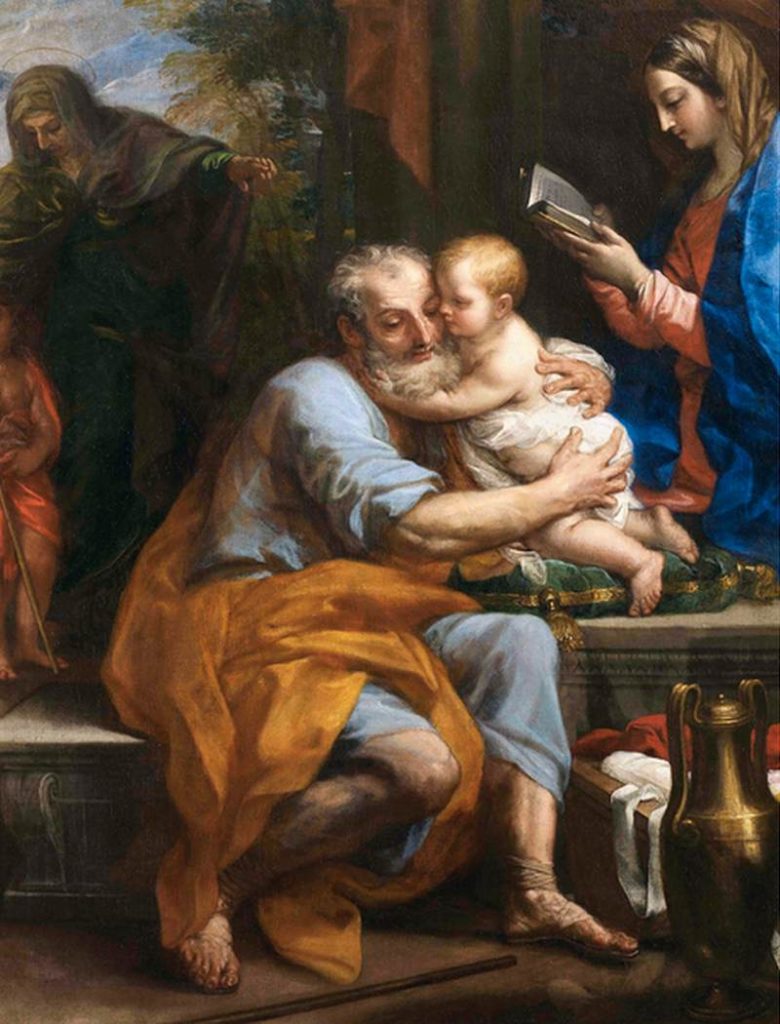The holy patriarch - as he is also called - was absolutely aware of the divine condition of Jesus, for he knew that he was the son of God, born of Mary by the work of the Holy Spirit.
Obviously, St. Joseph was aware that God assumed human nature, choosing his wife as his mother, who was always a virgin: before, during and after childbirth.
Far from keeping his distance from this Child begotten by the Holy Spirit, he would welcome him as a good father, and would give him all his affection and teachings. He had the courage to assume his role as the legal father of Jesus, once the angel revealed to him in a dream (Mt 1:21) the divine origin of the Child and his saving mission.
Thus, Joseph's paternity had its uniqueness, because he, as well as Jesus and Mary, knew that he was the son of God. But this did not prevent him from being an authentic father -very human- and that in order to be a father he learned "the trade" -and the benefit- of being a father.
Jesus was recognized by his contemporaries as the son of Joseph, or of the carpenter. And not in any other way. This is reflected in the Holy Gospels. That is to say, what was relevant for the friends and neighbors of the Holy Family was that paternal-filial relationship, precisely, as the most evident characteristic of that divine Child, son of his fellow citizens Myriam and Joseph.
True father to his Son
With what love would Joseph love Jesus, but with a full love, as a true father who knew himself to be his son?
We can then imagine the pain that Joseph felt when he heard from the angel in a dream (Mt 2:13) that Herod was looking for the Child, his son, in order to kill him. And, likewise, the joy that would have produced for him to have saved him from that murder by taking refuge in Egypt until the death of that ruler. Or the disconsolate search for the lost Child (Lk 2:44-45) until they found him and Mary in the temple teaching the doctors of the law.
In any case, also as a good husband of Mary, he would go with her, contrasting everything he perceived from God and how much he would afflict her. A wife like no other, on whom the one entrusted to him would lean, whom he would love unconditionally and from whom he would perceive that total love. A wife in whom to trust, with whom to walk, to educate and love both, well united, the Son of God.
The love that Joseph would lavish on his son would be inspired by the various references to tenderness in Sacred Scripture (Ps 103:13; Ps 145:9) as the Holy Father makes clear in the Patris Corde. The tenderness of a father, that is what Joseph would lavish on Jesus. At the same time he would be, as it is said, "....through thick and thin"For educating is both joyful and costly at the same time, and that joy and cost would not be spared to the holy patriarch.
Sacred Scripture (Lk 2:52) emphasizes that Jesus grew in stature and wisdom before God and mankind. This is thanks to St. Joseph, who exercised his fatherhood responsibly and conscientiously, and taught the Child everything in his power to form the Man who would carry out the mission of the only-begotten Son of God. He would introduce him to the experience of life; he would form him, after all, in freedom and responsibility.
Faithful instrument
The "littleness" that a simple carpenter or craftsman would feel before the greatness of the work that God entrusted to him - to be the legal father of his Son, that is, to be the father of God - would make him entrust himself totally to the Creator, who had arranged for it to be so.
Only abandoned into God's hands could he carry out his mission. Hence his attitude of generous acceptance of the divine will in order to fulfill the plan laid out; hence, in his dreams, he listened attentively to what was being said to him so that he could carry it out as faithfully as possible.
A humble man, hardly mentioned in the New Testament: in the passages of the Nativity of the Lord and in the sequence referring to the moment when Jesus got lost and was found by his parents in the temple preaching. Moreover, he left no trace of his future, since we do not know when or how he died.
He was not rich, he was just one of his own; no doubt with a strong and determined personality to do what he did, not afraid or scared of life, resolute in the face of the tasks that the Lord was entrusting to him.
Faithful and dedicated to his mission, he would never dispute the will of God, which sometimes came to him through the angels: he obeyed. And this in spite of the costly changes of plans that it implied, of the interruption of bonds of friendship, of the rootedness in different places, since each change of city - Bethlehem, Egypt, Nazareth... - would mean cutting with the previous and starting all over again. But always trusting in divine providence!











